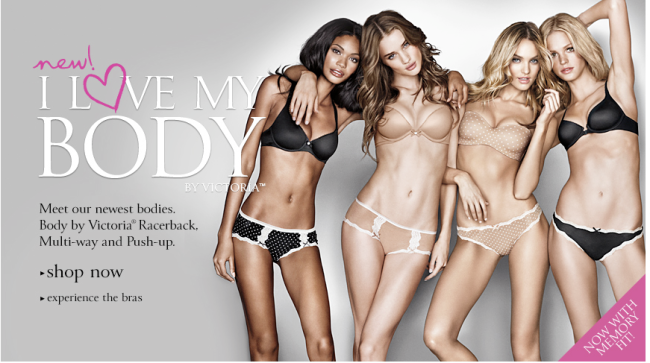As a white 18-year-old female, there are many advertisements that are targeted toward my demographic. Many of those advertise beauty products or clothing, as does the ad I chose to, for lack of a better term, analyse in this entry.
This is an ad for Victoria’s Secret lingerie, if you didn’t already notice. As we’ve discussed in class, ads try to sell you something that you think will better yourself. This one seems to portray that their lingerie will make you love your body, possibly throughout all body types (which I’ll discuss later). Let’s look at how well (or not) this ad hails me personally.
First, I look at this and see models, not myself, in the product. When I see an ad I need to be able to identify with it, or see myself in the product, to be able to count it as effective. Second, everyone in this ad (with exception of the African-American girl) is blonde or only a slightly darker colour, which is seen as the more desirable hair colour overall, which is displeasing to me, since I’ve always had dark hair (not meaning that I’m jealous, but just bringing up how unfair it is). I would say that because of my experience in seeing and examining ads, this one does not successfully hail me.
Back to the overall effect of the ad, there are many issues with it. One could see this ad as accepting of race and weight, if one simply glances quickly and doesn’t look more into it. However, upon closer inspection, this ad is sadly a display of what our society has come to in the face of what is ‘beauty’. The phrase “I love my body” is, in my opinion, trying to make women want to lose weight and look like the women in the ad instead of loving what their body is actually like. It could be “putting us in our place”(O’Shaughnessy & Stadler, Media and Society, p.185) in the way of ‘true beauty’. It could also be that this ad is trying to answer for us the question of “Would being fatter, thinner, or more attractive…change how you feel about yourself and how you are perceived by other people?” (O’Shaughnessy & Stadler, Media and Society, p.185) with the simple word ‘yes’.
There is also the matter of race. Three out of the four women in the ad are Caucasian, and the African-American, although having her arm slung around the shoulders of the girl next to her, is seemingly disconnected from the others. I’ll let you do with that what you will.
That being said, while this ad in particular doesn’t hail me (though, in part, manages to disgust me), there are some that do. Our society will be dominated by advertising until the day when we aren’t susceptible to them, which, in my opinion, won’t happen in our lifetime.